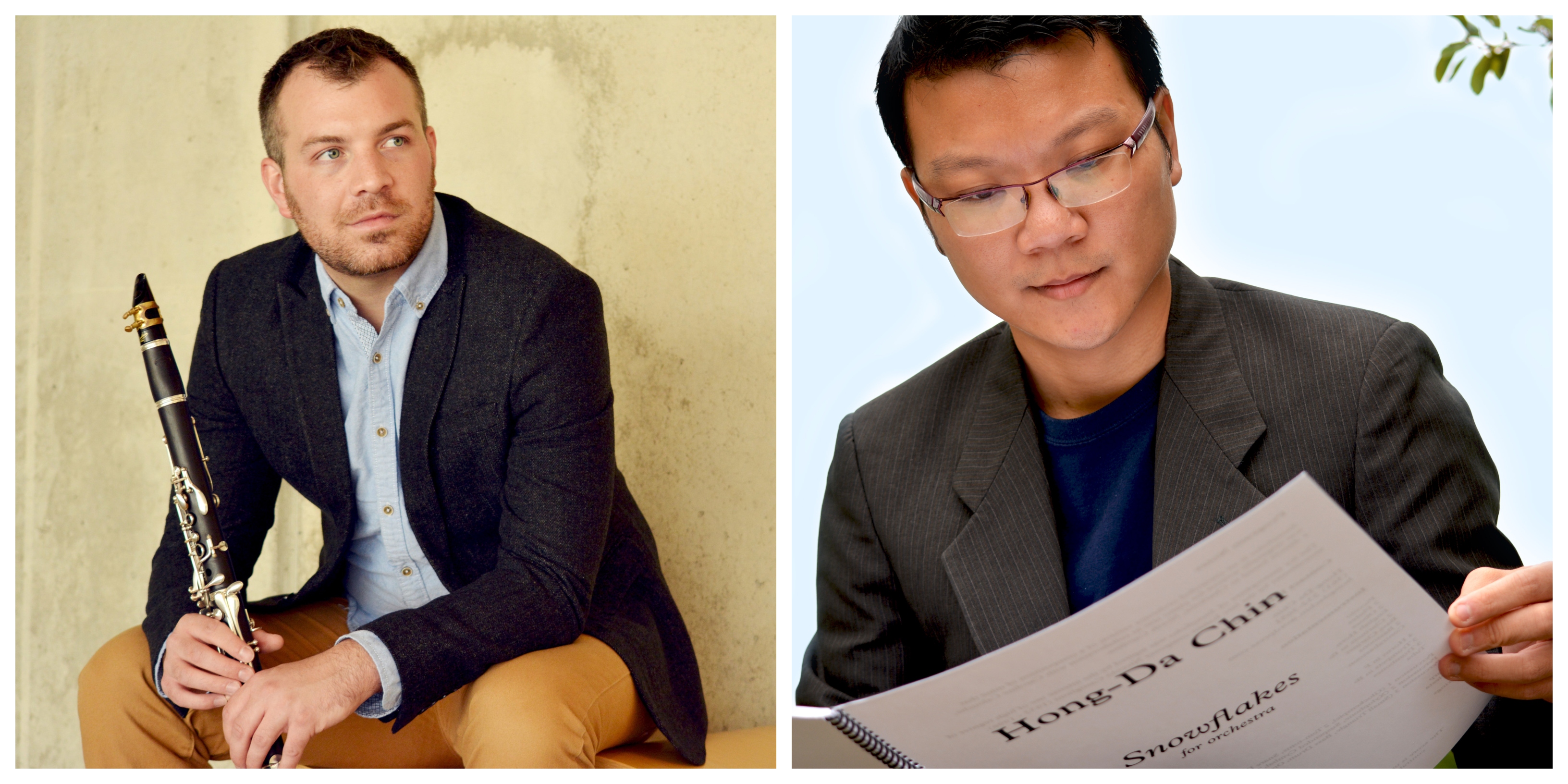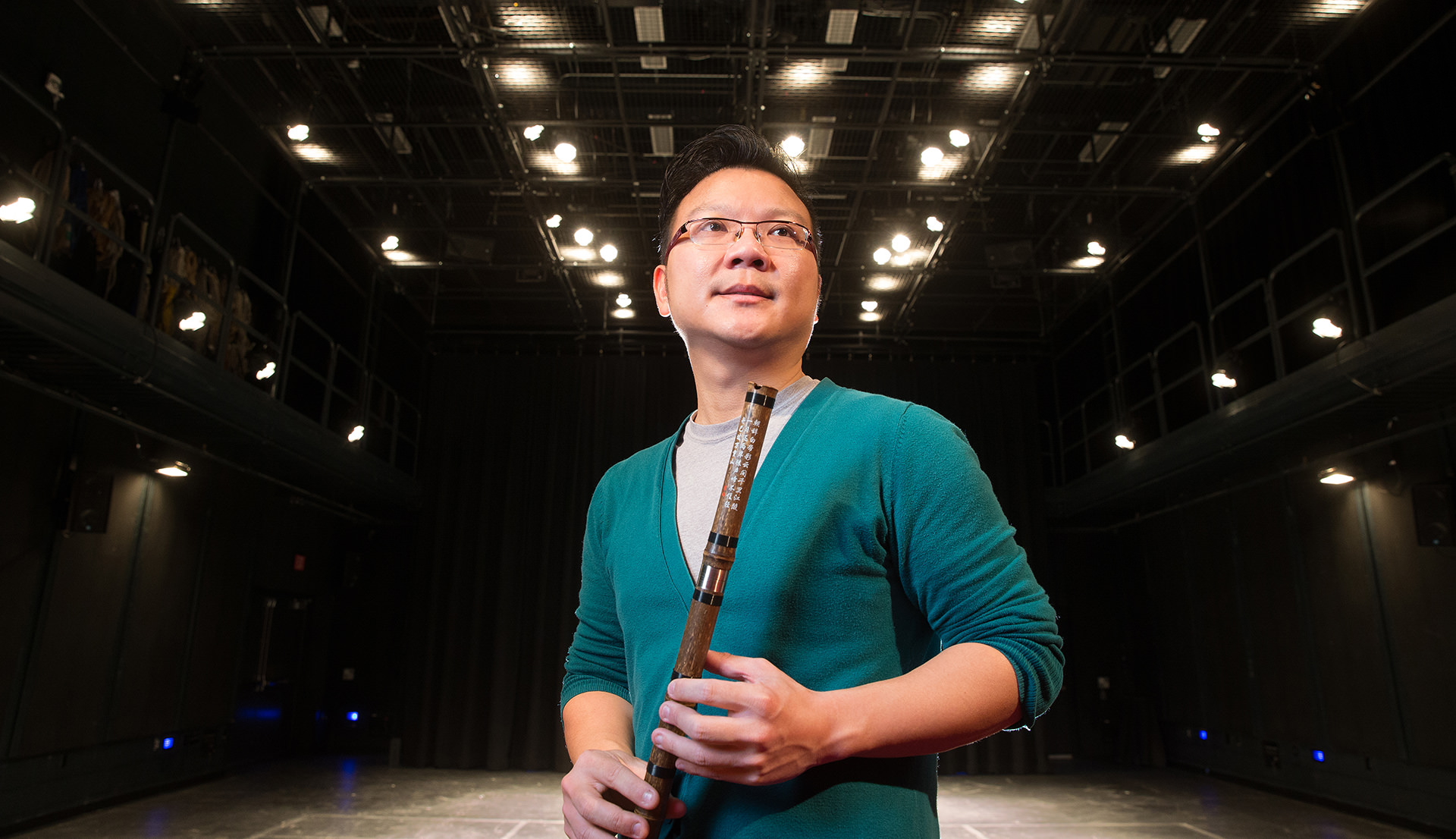by Jarrett Hoffman

Combining Chinese traditional music with contemporary repertoire, their upcoming concert — presented by No Exit on Friday, June 15 at 7:00 pm at Appletree Books — will include three duets (one of them by Hong-Da), six solo works, and six instruments (the two likely suspects, in addition to four Chinese flutes).
Let’s start with the bookends of the program. Giacinto Scelsi’s Ko-Lho and David Liptak’s Duo meld together the sounds of the clarinet and Western flute to fascinating effect, treating the instruments almost like conjoined twins.
Hearing an all-Scelsi program at Bowling Green State University is what first drew Hirthe to that composer. “I was really struck by how simple and powerful his music is,” the No Exit clarinetist, Flint Institute of Music faculty member, and BGSU doctoral candidate said during a recent telephone conversation.
How does Hirthe deal with the challenging multiphonics in Ko-Lho? “So much of it is how you use your air and shape your mouth. That way of playing isn’t conducive to ‘good’ clarinet playing — you have to give up a few things in order to do it well.”
Though similar to the Scelsi, Liptak’s Duo really occupies a different universe. “I think it brings in that traditional flute-clarinet world, but it’s also something that people aren’t necessarily used to hearing,” Hirthe said.
Listen to even ten seconds of Ken Ueno’s solo clarinet work I screamed at the sea until nodes swelled up, then my voice became the resonant noise of the sea, and the title will start to make sense.
“With pieces like that, I always find that you just have to let yourself go,” Hirthe said. “Again, don’t think about ‘good’ clarinet playing. Don’t think about the sound — just get yourself into the piece: what does it mean to be in front of the ocean and experience that loudness but also oneness?”
Kerrith Livengood originally wrote Show as a solo for tenor saxophone, and Hirthe planned to play a version for bass clarinet at New Music On the Point last summer. But some of the work’s technical demands — plus the wacky weather at the festival taking a toll on Hirthe’s bass — led him to premiere the clarinet version instead, which he’ll play again on Friday.

We began our conversation by discussing the traditional New Shepherd Song, which “describes the vastness of the prairie in inner Mongolia,” he said. Listen for the imitations of horses galloping and neighing.
He’ll play that work on the dizi, a bamboo flute that is played transversely (horizontally). The instrument has six finger holes and no keys, so chromatic playing requires “half-hole” fingerings, where the player covers a hole only partially.
“One advantage is that you are able to play glisses very easily, unlike the Western flute,” Hong-Da said. “The disadvantage is that you need to have very good ears to play chromaticism in tune. Everything is a half-hole, and sometimes it’s not exactly half — you just have to listen to it, like with the recorder.”
Two other keyless, bamboo flutes are the xiao (which he’ll play for The Remaining Snow in the Cold River) and the bawu (for The Fisherman’s Song). The ancestor of the shakuhachi, the xiao is played vertically like a recorder, and has a mouthpiece shaped like the letter U.
The mouthpiece of the bawu, on the other hand, is a piece of reed like that of a mouth organ, such as a harmonica. “You have to cover the entire mouthpiece, and then when you blow air into it, the reed will vibrate,” Hong-Da said. Both the bawu and the xun, which Hong-Da described as the Chinese ocarina, can only play a single octave. “The xun is made of clay and looks like an egg with eight finger holes,” the flutist said.
The sound of the xun resembles a human voice, making it a compelling match for Three Variations at Gate Yang, an ancient farewell tune about leaving China through that gate. “There was no guarantee you would be back because it was very dangerous out there — you had the desert, and the tribes that were hostile against the Chinese,” Hong-Da said.
We closed our conversation discussing his duo One Gallon of Tears, which premiered last month at the University of Maryland in its original version for two Western flutes.
“It’s written in memory of the 239 victims of Malaysian Airlines flight MH370, which went missing on March 8, 2014,” Hong-Da said, recalling the figures without hesitation. “The plane still hasn’t been found. And since I’m Malaysian, this incident means a lot to me. It was a dark day for Malaysians, and for the Chinese and everyone else on the plane.” The piece is made up of microtonal, descending figures. “Those lines are like tears flowing down one’s cheek,” the composer said.
Published on ClevelandClassical.com June 12, 2018.
Click here for a printable copy of this article



